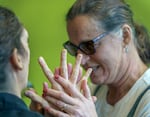It’s not often a new language emerges.
But in the last 15 years, a new language was born right here in the Pacific Northwest. It’s called Protactile, and it was created by a group of DeafBlind people who prioritize touch.
One of the people at the center of creating this new language is Jelica Nuccio. She recently moved to Monmouth, Oregon, where Western Oregon University just received a grant for $2.1 million from the U.S. Department of Education’s Rehabilitation Services Administration, or RSA, to help train Protactile language interpreters.
DeafBlind people like Nuccio have traditionally used variations on sign language to communicate, but it can be easy to miss important details in a language that is designed to be seen.
“We can’t grow if we always are only getting things secondhand from other people who are seeing them in the world firsthand because people are uncomfortable shifting to a tactile ground,” Nuccio said. “There have been years and years and years of isolation for DeafBlind people.”

Jelica Nuccio is one of the founders of a new language called Protactile. It allows DeafBlind people to communicate directly, without having to rely on an American Sign Language interpreter.
Kristyna Wentz-Graff / OPB
Protactile was born when Nuccio first took over the Deaf-Blind Service Center in Seattle. At that point, she began to advocate for DeafBlind people to communicate with each other without the use of interpreters. “I said no, we don’t need interpreters between us in our midst 24/7. We can run this thing ourselves directly in contact with one another,” Nuccio said.
“The original intention was not to create a language: it was simply to be in communication with each other directly.
“Once we got in touch we realized that we were happening upon some different communication practices,” Nuccio said. “So we brought in some other DeafBlind people and we started interacting using those communication practices. We got a linguistic anthropologist involved. We basically created a space where everyone is DeafBlind and Protactile and asked: ‘If the world was just full of DeafBlind people — there were no hearing or sighted people on the planet — what would we do? How would we do it?’”
Nuccio says the experience of learning and creating the Protactile language has changed her life.
She now runs a business called Tactile Communications, which trains DeafBlind individuals to be more autonomous. She is also the lead trainer for the DeafBlind Interpreting Institute at Western Oregon University.
“I really realized how devoid of the human experience information can be when people aren’t connected and touched directly,” Nuccio said. “So touch and Protactile language is the foundation for my life. It truly is. I mean, it allows me to function in the world.”





